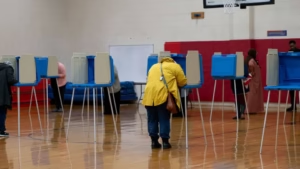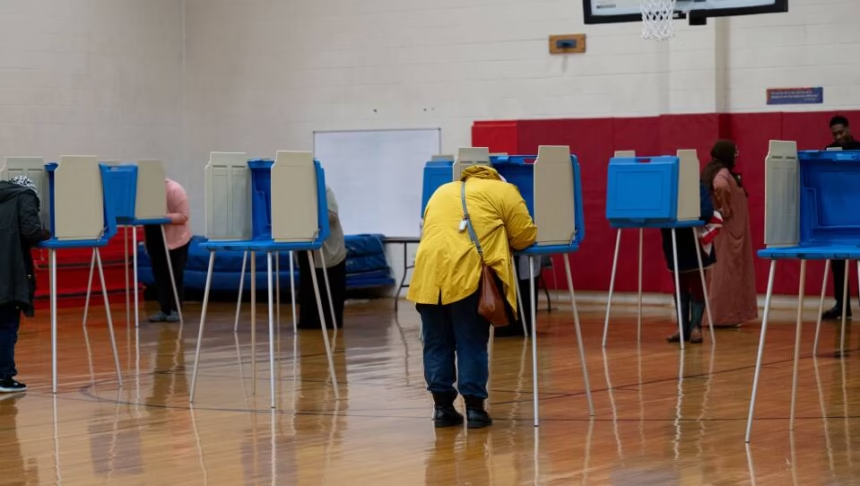Haitian-American political leaders strengthen their foothold in local Massachusetts politics. At the same time, Boston Mayor Michelle Wu secures an unchallenged second term amid strong Democratic momentum.
Several Haitian-American political figures reaffirmed their influence in the November 4 municipal elections across Massachusetts. In Boston, Ruthzee Louijeune, president of the City Council, finished first in the at-large race. This solidified her standing as one of the most influential voices in city leadership.
“This result confirms that Boston is moving in the right direction,” Louijeune said in her victory speech, as quoted by The Boston Globe. “It’s an incredible honor for me, the daughter of Haitian immigrants and a child of Mattapan, to continue serving this city.”
Louijeune led the citywide vote ahead of Julia Mejia, followed by Erin Murphy and Henry Santana, completing the group of four re-elected councilors.
Not all Haitian-American candidates shared similar success. Marvin D. Martelier, a U.S. Army veteran and entrepreneur, was unsuccessful in his first bid for an at-large council seat, failing to secure enough votes for election.
In District 5, which includes Mattapan, Hyde Park, and parts of Roslindale, Witson Pierre was defeated by Enrique Pepén. Pepén, a Dominican-American candidate, won nearly 69 percent of the vote across 30 precincts.
In Brockton, Jean Bradley Derenoncourt narrowly lost his historic bid to become the city’s first Haitian-American mayor. He trailed by just 270 votes. Derenoncourt earned 6,420 (48.57%), while Moises Rodrigues received 6,680 (50.54%). Rodrigues, a Cape Verdean-American, will now lead the city for the next four years.
More Haitian Successes in Neighboring Cities
In Randolph, Natacha Clerger retained her at-large City Council seat, along with three other incumbents. However, Guerlince Semerzier was defeated for the second time.
In Everett, Guerline Alcy Jabouin won re-election as an at-large councilor, maintaining her influence on the city’s political landscape.
Boston: Michelle Wu Re-Elected Unopposed
In Boston, Mayor Michelle Wu secured a second four-year term after running unopposed. Preliminary results from the city’s Election Department were reported by The Boston Herald and WBUR. The Democratic mayor won what was largely a symbolic race and consolidated her majority on the City Council.
Shortly after 9:30 p.m., Wu addressed supporters at Grace by Nia, a club in the Seaport District.
“This year, in the face of chaos and cruelty from a federal administration, we had a choice to make — to give in to fear, to retreat, or to double down on our commitment to this nation’s founding values,” she said, according to The Boston Herald.
“This year, in the face of chaos and cruelty from a federal administration, we had a choice to make — to give in to fear, to retreat, or to double down on our commitment to this nation’s founding values,” she said, according to The Boston Herald.
Taking a firm tone, she added:
“Boston will not bow to a criminal who acts like a king. That’s a lesson we’re prepared to repeat as many times as necessary.”
“Boston will not bow to a criminal who acts like a king. That’s a lesson we’re prepared to repeat as many times as necessary.”
The November election carried little suspense. Josh Kraft, Wu’s main challenger and son of New England Patriots owner Robert Kraft, withdrew after the September primary. Wu led by nearly 50 points. His exit left the incumbent unopposed — a rarity in a city of Boston’s size.
As Boston.com reported, Wu then turned her campaign efforts toward strengthening her influence within the City Council. She particularly supported Henry Santana, a former aide running for re-election.
Santana Wins; Frank Baker’s Comeback Fails
The City Council race emerged as the real political battleground of the evening. As GBH News reported, Henry Santana won re-election by narrowly holding his seat in a close contest against former councilor Frank Baker, who was not successful in his comeback attempt.
“Sometimes, it’s the outsider who wins,” Santana told supporters. “We were outspent at every stage, but once again, we proved that Boston is not for sale.”
Wu celebrated his victory, saying:
“Henry, you’ve once again shown that Boston can’t be bullied or bought, no matter who tries to spread fear or drag us backward.”
“Henry, you’ve once again shown that Boston can’t be bullied or bought, no matter who tries to spread fear or drag us backward.”
Unofficial city results show Santana winning about 15 percent of the vote. Baker, who was backed by former mayor Marty Walsh, received 10 percent.
In District 7, centered on Roxbury, the seat vacated by Tania Fernandes Anderson, who resigned after being convicted of corruption, was won by Reverend Miniard Culpepper.
According to city data cited by The Boston Herald, Culpepper received 53 percent of the vote. He defeated educator and community activist Said Ahmed, who earned 45 percent.
According to city data cited by The Boston Herald, Culpepper received 53 percent of the vote. He defeated educator and community activist Said Ahmed, who earned 45 percent.
“This is a moment of reconciliation and renewal for Roxbury,” Culpepper said, pastor of the Pleasant Hill Missionary Baptist Church.
Wu Outlines Priorities for Her Second Term
Re-elected without opposition, Wu outlined her second-term priorities: expanding affordable housing, advancing climate resilience, strengthening public safety, and promoting social inclusion.
She reaffirmed that local governance must “protect the dignity of everyone,” including undocumented residents. This is a message she has repeated since her first term.
“This election wasn’t just about how we govern, but about what we believe,” Wu said. “Should wealth buy power? No. Does experience matter? Yes.”
Her remarks underscored a vision of city leadership rooted in competence, transparency, and civic unity — a stark contrast to the divisive tone of national politics.
Analysts cited by The Boston Herald attribute Wu’s popularity to a diverse coalition of young voters, immigrant communities, and progressives. Yet, she faces significant challenges: housing affordability, homelessness, tensions with the police union, and real estate regulation.
Concluding her speech, Wu delivered a message of unity:
“Boston never backs down. And as long as we believe in justice and dignity, this city will continue to grow.”
“Boston never backs down. And as long as we believe in justice and dignity, this city will continue to grow.”








